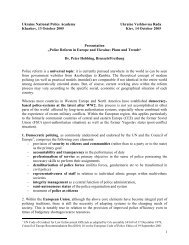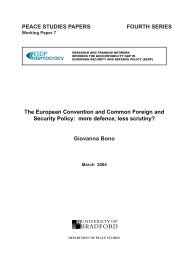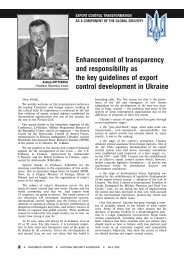The Challenges and Opportunities of Security Sector Reform in Post ...
The Challenges and Opportunities of Security Sector Reform in Post ...
The Challenges and Opportunities of Security Sector Reform in Post ...
Create successful ePaper yourself
Turn your PDF publications into a flip-book with our unique Google optimized e-Paper software.
<strong>Security</strong> <strong>Sector</strong> <strong>Reform</strong> (SSR): While there is a general recognition that the peace cannot be<br />
susta<strong>in</strong>ed without more effective <strong>and</strong> accountable, state security provision, a<br />
comprehensive strategy for SSR has thus far not been developed. This worry<strong>in</strong>g gap is<br />
due to a number <strong>of</strong> factors: a deliberate policy <strong>of</strong> some with<strong>in</strong> both Government <strong>and</strong> the<br />
donor community <strong>of</strong> marg<strong>in</strong>alis<strong>in</strong>g security actors who are largely held responsible for<br />
the conflict <strong>and</strong> kill<strong>in</strong>g which has engulfed Liberia over the past 16 years; compet<strong>in</strong>g<br />
dem<strong>and</strong>s on the attention <strong>and</strong> resources <strong>of</strong> both donors <strong>and</strong> Government for<br />
reconstruction; <strong>and</strong> the lack <strong>of</strong> a holistic response to Liberia’s security problems. This<br />
oversight is perhaps most glar<strong>in</strong>g <strong>in</strong> the context <strong>of</strong> the UN Secretary General’s own<br />
quarterly assessments <strong>of</strong> Liberia’s reconstruction needs which gloss over the challenges<br />
<strong>of</strong> SSR, present<strong>in</strong>g them largely <strong>in</strong> terms <strong>of</strong> ‘police reform’.<br />
This is short-sighted. Transformation - as opposed to ‘reform’ - <strong>of</strong> the entire state<br />
security apparatus should be at the heart <strong>of</strong> the peace <strong>and</strong> reconstruction process. Unless<br />
the limitations <strong>of</strong> past security models are addressed, there is a danger <strong>of</strong> recreat<strong>in</strong>g the<br />
conditions that gave rise to Liberia’s war <strong>in</strong> the first place. <strong>The</strong> challenge is not simply to<br />
demilitarise, but to create a new framework for state security action that can help to<br />
avoid the conflicts <strong>of</strong> the past between the security <strong>in</strong>terests <strong>of</strong> Liberia’s political regimes<br />
<strong>and</strong> the security <strong>in</strong>terests <strong>of</strong> its population. Achiev<strong>in</strong>g this will be a long <strong>and</strong> complicated<br />
process, but it will <strong>in</strong>volve fundamentally review<strong>in</strong>g the very objectives <strong>and</strong> means <strong>of</strong><br />
state security provision, <strong>in</strong>clud<strong>in</strong>g <strong>in</strong>stitutional cultures, systems <strong>and</strong> processes.<br />
To date, UNMIL has focused exclusively on one component <strong>of</strong> this broader challenge<br />
which is police reform <strong>and</strong> the rule <strong>of</strong> law. While there has been some tangible progress<br />
<strong>in</strong> terms <strong>of</strong> tra<strong>in</strong><strong>in</strong>g police <strong>and</strong> <strong>in</strong>creas<strong>in</strong>g their presence on the streets <strong>of</strong> Monrovia, <strong>and</strong><br />
some evidence <strong>of</strong> coord<strong>in</strong>ation between several UNMIL components (CIVPOL, Human<br />
Rights, Corrections <strong>and</strong> Judiciary), this work has been undertaken <strong>in</strong> isolation from<br />
restructur<strong>in</strong>g <strong>of</strong> the armed forces or wider governance reforms with<strong>in</strong> the security sector<br />
which are yet to be launched. <strong>The</strong> US has expressed a keen <strong>in</strong>terest <strong>in</strong> support<strong>in</strong>g the<br />
restructur<strong>in</strong>g <strong>of</strong> the AFL which was orig<strong>in</strong>ally based on the US model <strong>and</strong> has previously<br />
received US assistance. US support is conditional on the NTGL first demonstrat<strong>in</strong>g<br />
visible <strong>in</strong>terest <strong>in</strong> reform by undertak<strong>in</strong>g to re-document the AFL, though resources to<br />
carry this out have still not been found. Of greater concern, however, is that the<br />
restructur<strong>in</strong>g plan be<strong>in</strong>g produced by the Liberian M<strong>in</strong>istry <strong>of</strong> Defence with Pentagon<br />
assistance does not devote adequate attention to the question <strong>of</strong> civil management <strong>of</strong> the<br />
army. Furthermore, other security agencies, <strong>in</strong>clud<strong>in</strong>g, the National <strong>Security</strong> Agency,<br />
National Bureau <strong>of</strong> Investigation <strong>and</strong> Bureau for Immigration <strong>and</strong> Naturalisation are<br />
completely left out <strong>of</strong> the plan.<br />
Disarmament, Demobilisation, Rehabilitation <strong>and</strong> Re<strong>in</strong>tegration (DDRR): <strong>The</strong> success <strong>of</strong> the<br />
Liberian reconstruction programme also h<strong>in</strong>ges upon an effective DDRR programme.<br />
<strong>The</strong> fast pace <strong>of</strong> disarmament, after some early hitches <strong>in</strong> the process <strong>in</strong> December 2003,<br />
is one <strong>of</strong> the early <strong>in</strong>dicators <strong>of</strong> the commitment <strong>of</strong> the armed factions to peace <strong>and</strong><br />
disarmament. However, there are real concerns about the way <strong>in</strong> which the programme is<br />
be<strong>in</strong>g implemented. <strong>The</strong>se concerns centre around four ma<strong>in</strong> issues:<br />
First, the UN grossly underestimated the number <strong>of</strong> combatants <strong>and</strong> people associated<br />
with the warr<strong>in</strong>g factions that would need to be demobilised. As at 1 August 2004, more<br />
than 60,000 combatants had gone through the disarmament process, with several<br />
counties yet to be covered – compared to the UN’s <strong>in</strong>itial estimate <strong>of</strong> 38,000 troops. This<br />
has had cost implications for disarmament <strong>and</strong> overall re<strong>in</strong>tegration, <strong>in</strong> particular. While<br />
53

















